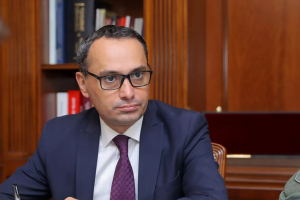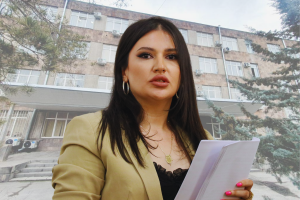The trial of Judge Arusyak Aleksanyan, her assistant Tamara Petrosyan, and advocate Erik Aleksanyan continued yesterday, August 13, in the Anti-Corruption Criminal Court, presided over by Judge Vahe Dolmazyan.
On October 17, 2022, the Supreme Judicial Council approved the Prosecutor General’s Office’s motions to initiate criminal proceedings against Judge Arusyak Aleksanyan and to consent to her detention. In the same case, advocate Erik Aleksanyan was charged under Article 46-441 of the Criminal Code for assisting an official in abusing power or official authority or influence derived from them, or exceeding authority. Arusyak Aleksanyan’s assistant, Tamara Petrosyan, was also indicted in this case.
According to the indictment, the judge rendered an obviously unjust judicial act and abused her official powers. She granted the petition of Erik Aleksanyan, defense advocate for Sergey Grigoryan (known by the alias “Faz” and considered a criminal authority), changing the latter’s preventive measure and releasing him from detention on a 2.5 million dram bail. Sergey Grigoryan is a friend of Arusyak Aleksanyan’s brother, Rustam Aleksanyan.
The defendants deny all charges brought against them.
Iravaban.net reports that Arusyak Aleksanyan’s defense counsel, Yerem Sargsyan, had petitioned to examine several factual circumstances relevant to the case during the evidentiary process.
In this court session, the defense emphasized that the data under examination pertains to the fact that criminal prosecution was initiated against his client without the consent of the Supreme Judicial Council.
He noted that the issue is to demonstrate that officials continuously document alleged criminal acts which, according to them, were committed by Arusyak Aleksanyan.
The evidence under examination included protocols drawn up from operational-investigative actions, information about Arusyak Aleksanyan’s border crossings, various certificates, and details about her brother and sister-in-law.
There were also protocols regarding external and internal surveillance, and operational-investigative measures for monitoring telephone communications.
“It is not coincidental that legislation, the Constitution, and international documents clearly provide safeguards regarding the process of initiating and implementing criminal prosecution against a judge by state bodies,” Yerem Sargsyan stated.
“Other branches of government should not have unrestricted ability to conduct de facto criminal prosecution against a judge without the consent of the SJC, the guarantor of judicial power and independence. What is this if not a mere formality?” he added.
According to the defense, after initiating criminal proceedings, actions were taken aimed at continuing the criminal prosecution against Arusyak Aleksanyan, with factual data being reported to “reinforce” the ongoing prosecution.
“I believe that the state and domestic authorities have failed to accurately apply the relevant legislation, have not demonstrated good faith, but rather have shown dishonesty regarding the guarantees of independence and immunity for a specific judge,” the defense counsel noted.
The evidence was examined. Defendant Erik Aleksanyan stated that he would file a motion to supplement the evidence at the next court session.
Subsequently, Arusyak Aleksanyan’s other defense advocates presented a petition.
The petition requested the court to summon four employees of the NSS Department of Economic Security and Anti-Corruption for cross-examination.
According to the defense, the aforementioned report, based on which NSS employees drew up protocols, was the source of operational-investigative measures against Arusyak Aleksanyan, initiating actions that seriously interfered with the right to privacy.
He also noted that the defense would ask the NSS to provide information on whether the operational data was acted upon, and to provide an excerpt without disclosing state secrets.
“Until the NSS provides that information, our doubts will persist. Even if this trial concludes, even if a guilty verdict is reached, one, two, or three years later, that secret must be revealed – ultimately, was Hambaryan’s data present or not, and did he commit a service violation or not?” he stated.
The prosecutor, expressing his position on the petition, noted that the presented evidence is unsubstantiated, and there is a significant, substantial gap between the petition and the established factual circumstances in this criminal case.
“One reason is that the authors of the petition joined the trial at a later stage. Otherwise, assuming their presumption of good faith, I could consider it established that if they were aware of such documents in the criminal case, they would not have cited their absence as justification for the petition in their written submission,” the prosecutor noted.
Addressing one advocate’s claim that no operational inquiries, information acquisition, or other measures were conducted, and that there is no protocol about it, the prosecutor emphasized that the mentioned protocol was indeed drawn up, is in the first volume, and was examined during the main hearing phase.
Regarding the presented petition, the public prosecutor also emphasized: “Certain claims were made about the content of the operational officer’s report. Here too, we heard contradictory positions. In one instance, the defense insisted that the operational officer should be questioned to clarify the authenticity of the operational information received within the framework of the right to cross-examination, and that he should justify the validity of his report.
It can be inferred that questions should be posed to the operational officer and his superiors, including about the validity of the bribery information. However, it seems that in the end, Mr. Ghazaryan refuted this, noting that they are not prepared to make inquiries about the source of obtaining operational information, which are state secrets.”
In his statement, the prosecutor also noted that insufficient justifications have been presented for summoning the relevant NSS employees for interrogation and questioning them about the report, the source of the information contained in it, and its validity, given that in one case, the sources of information are protected by law, and in the other, the validity of the information has been verified by the superior court, with written evidence of their validity present in the criminal case materials.
The session was adjourned, with the court set to address the petition issue at the next session.
For more details, please refer to the video.
Mariam Shahnazaryan
Photos by Hasmik Sargsyan

















